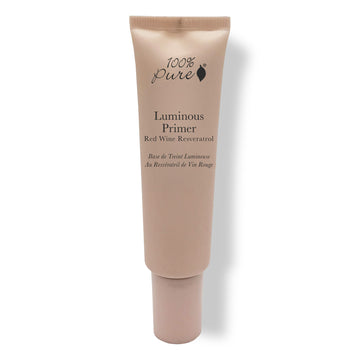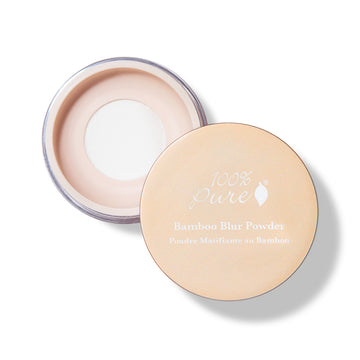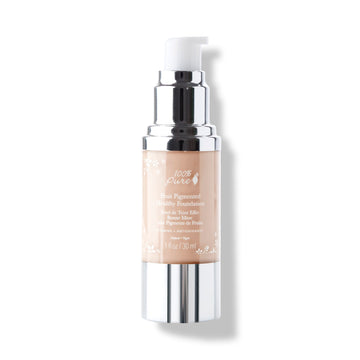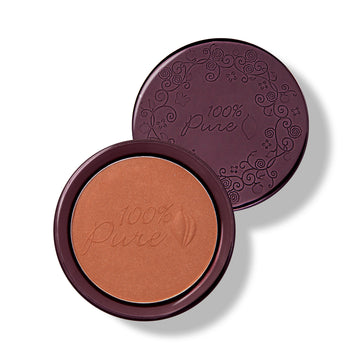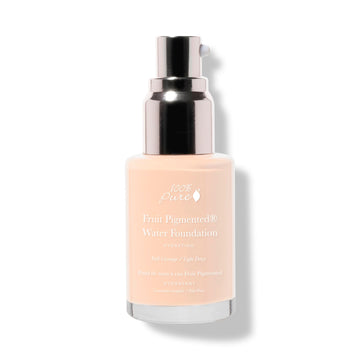How to get a seamless foundation match using a skin undertones chart
Written by: 100% PURE ®
Remember how tricky it was to find your perfect shade of foundation? If you couldn’t find a skin undertone chart, did you take a brave plunge in the beauty section of your local drugstore, or did you seek expertise by getting professionally matched?
There’s nothing more satisfying than a perfectly matched foundation – not only does it boost our confidence, it’s an essential part of wearing complexion products. A matching foundation that flatters our skin type, coverage preference, and suits our lifestyle can be like spotting a rainbow – a rare, beautiful sight.
We’ve said it before and we’ll say it again – skin is complicated, and a foundation that’s worked for you for years might all of a sudden look less than lovely. Perhaps you just got back from a divine tropical vacation with tanner skin, or your foundation is simply looking a bit lackluster lately. It might be time to check out a skin undertones chart and switch up your foundation shade!
What’s the best way to select a foundation specifically for your skin tone? We find it helpful to use a skin undertone chart when possible, to help visualize your shade. You can also employ a few classic tricks for determining skin tone, undertone, and matching our foundation.
Read ahead for some easy ways to determine your skin tone, and perfect the match of your complexion products!
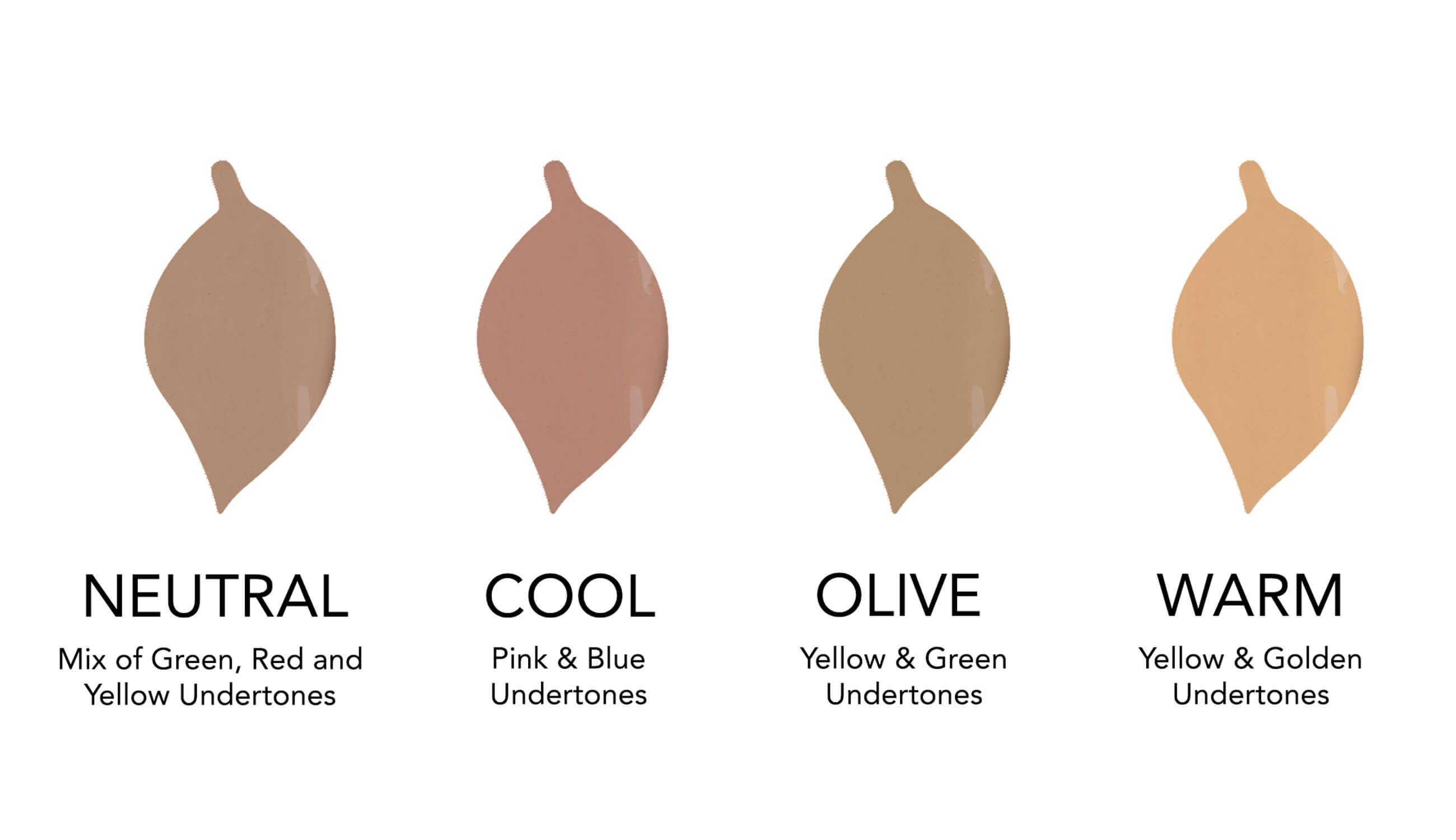
How do you determine your skin’s undertone, and why is it important? An undertone essentially determines the temperature of your skin. We’ll break it down: your skin tone determines the depth of your complexion, but your undertone is what makes your overall skin tone uniquely you. This is where a skin undertone chart comes in.
Undertones in a skin undertones chart are often categorized as warm, cool, and neutral or olive. For example, undertones can give your skin a subtle pink or yellow glow, or a mix of both if you have a neutral skin tone. In many ways, we actually think the undertone is even more important than our overall skin tone.
So why is an undertone more important than your overall tone? Well, a foundation that’s a bit too light can be deepened with a great bronzer. A concealer that’s a single shade too dark might be brightened up by your under eye setting powder. But we’ve found that most often when a complexion product looks off, it’s because the undertone doesn’t quite match.
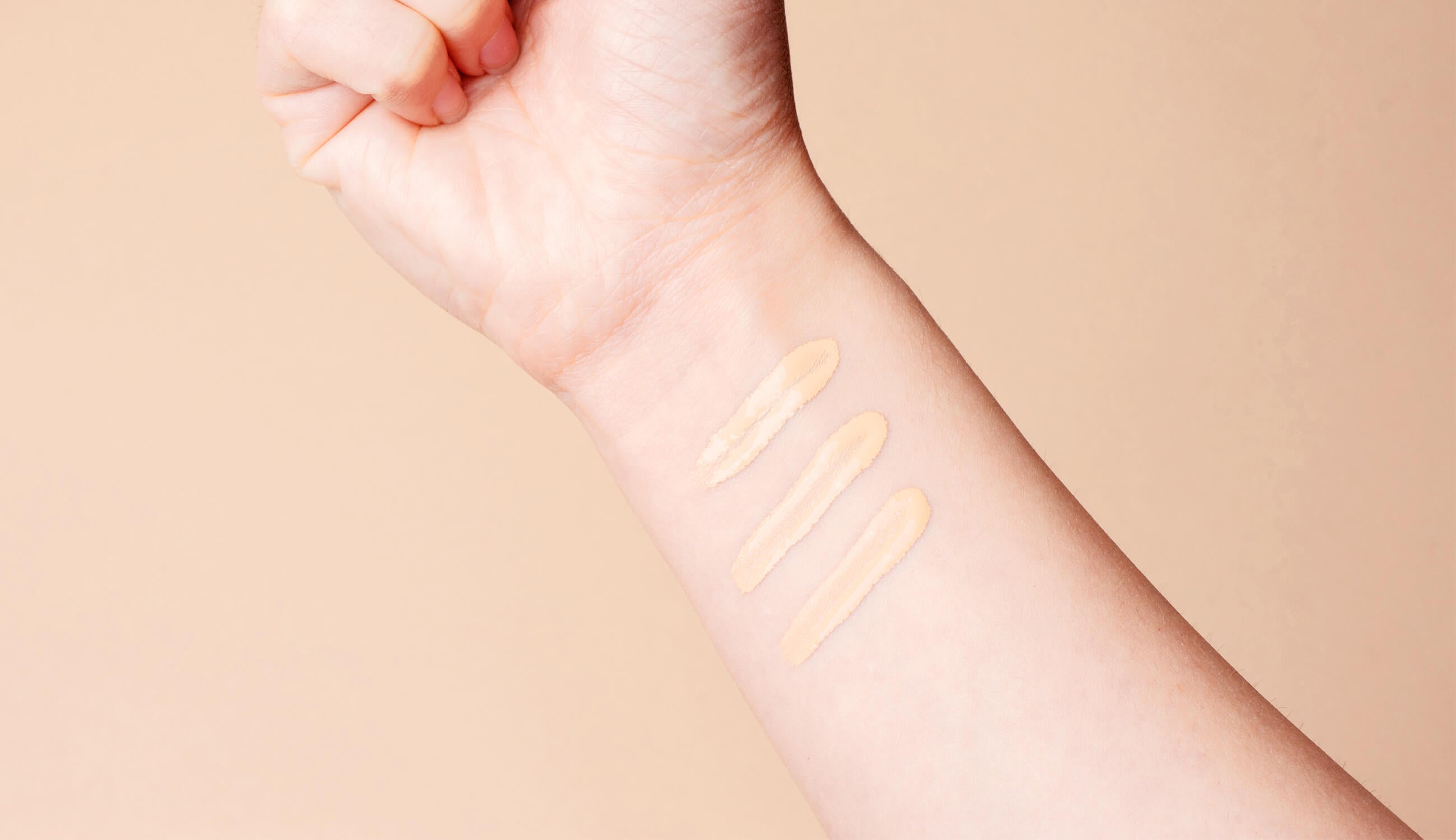
We think we owe you an apology: we may have made undertones sound like something intimidating, when they aren’t! It can be relatively easy to figure out your skin’s undertones once you know a few simple tricks!
Before we begin, it’s important to understand that your undertone can appear as one of six different shades. In the warm family there’s yellow, peach, and gold. On the cool side, skin might appear slightly pink, blue, or red. Below we’ll share a few easy tricks for determining where you fall in terms of skin undertone.
#1: The Jewelry Test
What finish do you prefer in jewelry between silver and gold? Is there a particular metal that always gets you compliments when you wear it? It isn’t just a taste thing – silver tends to flatter cooler undertones, while gold looks heavenly on warm tones. If you’re really lucky, you might be able to pull off both: meaning you’ve fallen in the neutral undertone category.
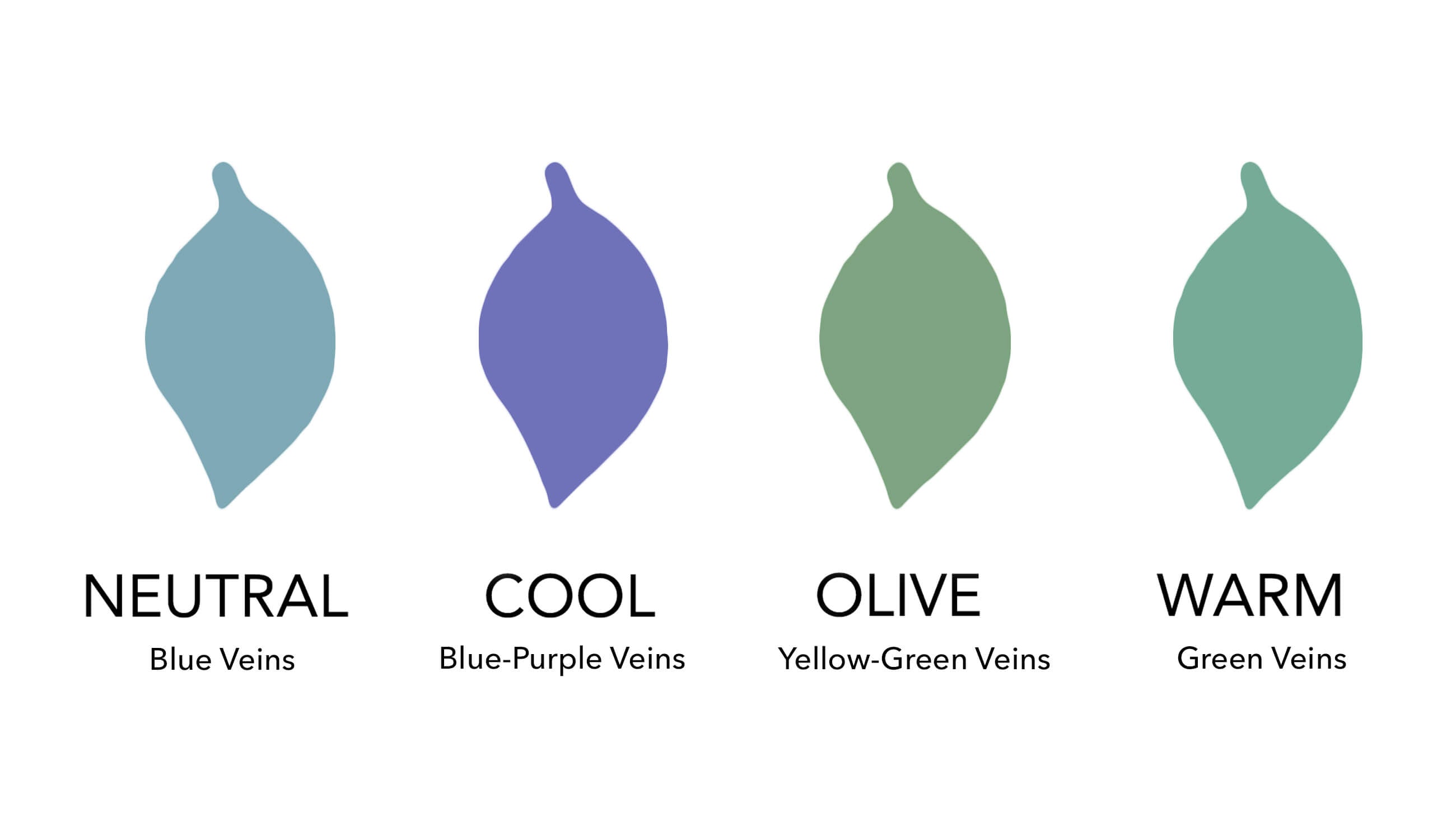
#2: The Vein Test
This one is even easier than the jewelry test, and doesn’t require a chart. Simply find some bright natural lighting, and look at the veins in your wrist. Through the skin, do your veins appear greener or do they have more of a blue cast?
Green means that the undertones in your skin are warm or golden, while blue means that you definitely have a cool skin temperature. Olive and neutral complexions may not be able to determine a clear winner, instead seeing a mix of blue, green, and purple.
When all else fails – get color matched
While these two tricks are definitely handy, that doesn’t mean they’re foolproof. Sometimes in poor lighting, or if you have a close to neutral skin tone, it may still be difficult to determine your exact undertone with a skin undertones chart. In this case, a second opinion would be wise; most beauty stores can help you determine your undertone. Simply ask a makeup artist or beauty professional to match you in-store!
Now that we’ve got a handle on our undertone with a skin undertone chart, we’ve got to take the next step into overall skin tone territory. This is where we find skin tone charts especially helpful, as they divide skin tone into different categories like fair, light, medium, and dark that make it much easier to find our foundation and concealer shades.
The good news is that as long as you have your undertone or skin temperature correct based on a skin undertone chart, your skin tone’s depth is usually within a 2-3 shade window.
Think of your undertone as the color family that your skin belongs to: your skin tone would be how saturated or light you fall in that color’s spectrum. Most skin tone categories use phrases like fair, light-medium, medium, dark, and dark-deep to help us determine our complexion match.
Other brands might use a number system to help us find our shade; for example, the Fruit Pigmented® Full Coverage Water Foundation. Not only do we take the guesswork out of undertones, we offer an epic shade range of almost 20 unique shades. If you consider yourself to have light or fair skin, you’d have a lower number. In this system, your skin tone should become richer as the foundation shade number grows.
PRO TIP: If you have oily or combination skin, you’re more prone to foundation oxidizing during wear. Make sure to prep the skin with a primer, use the best foundation for oily skin, and set with a lightweight powder to avoid your complexion products changing color on you throughout the day.
Here are some easy methods for ensuring your foundation and concealer flatter you every time:
-
First, always take the time for skin prep; this could mean giving your moisturizer time to sink in, or letting your primer fully absorb. This is an important first step in how to apply foundation.
-
Natural SPF products will contain zinc oxide, which causes a white cast on the skin. Take this into account if you have a medium to deep skin tone, and adjust your shade choice accordingly. This is one way to avoid foundation faux pas.
-
When in doubt, go for a darker product; products that are too light look less flattering and tend to be more aging. Just be sure to blend past your jaw and into your neck to ensure seamless color (this is one of several foundation pro tips).
-
Don’t be afraid to mix or layer products to get a custom complexion! For example, try using a sheer tinted moisturizer all over the face and touching up your undereyes and t-zone with a full coverage product. This can deliver a more natural finish, which aids in a flawless color match.
-
Use a setting spray or powder to ensure your products provide longer wear, and to keep your products true to color. You can even layer powder foundation over liquid foundation for extra coverage.
Remember earlier, when we asked if your complexion products have been looking a little off lately? Well it could also be the products you’re using that are causing that unflattering look. Here are some ways our complexion can go majorly wrong:
You’re wearing the wrong undertone
When we’re wearing the wrong undertone in our makeup rather than choosing one based on a skin undertones chart, it shows instantly. If a person with warm skin is wearing cool toned products, their skin will read as grey or lifeless. Cool toned folks wearing warm tones won’t look as jarring, but when compared to their neck, chest, and hands, the difference will be instantly apparent.
You’re wearing the wrong shade
This one is easy to mess up, since many of us shop online and even most beauty stores have, let’s just say, magical lighting. When we have the wrong shade of concealer or foundation on, it can give us a clown-like appearance. This tends to make our makeup look heavier than we’d like, and can even make us look older.
Still curious about the best ways to flatter your skin tone? Find a nail color suited to your complexion, or a blush that complements your skin. Find all these and more in the makeup section of our blog!
What are the different types of skin tones and how can I identify mine?
Skin tones are generally categorized as fair, light, medium, olive, tan, brown, and deep. To identify your skin tone, observe your skin in natural light. Fair skin tends to burn easily in the sun, while light skin may tan slightly. Medium skin usually tans well, olive skin has a neutral, slightly greenish undertone, tan and brown skin tones tan deeply, and deep skin rarely burns and is rich in melanin.
How does the vein test help in determining skin tone?
The vein test is a popular method to determine your skin's undertone. Look at the veins on your wrist in natural light. If they appear blue or purple, you likely have a cool undertone. If they look green or olive, you have a warm undertone. If it's hard to discern, you probably have a neutral undertone.
Can jewelry help in figuring out my skin tone?
Yes, jewelry can be a quick way to assess your undertone. Generally, if gold jewelry complements your skin better, you have a warm undertone. If silver jewelry looks more flattering, you likely have a cool undertone. If both suit you well, you may have a neutral undertone.
What role does the sun's reaction to my skin play in determining skin tone?
Your skin's reaction to the sun is a good indicator of its tone and undertone. If you burn easily and rarely tan, you probably have a fair or light skin tone with a cool undertone. If you tan easily without burning, your skin tone may be medium, olive, or deeper, often with a warm or neutral undertone.
Are there any tools or apps that can help me determine my skin tone accurately?
Yes, there are various tools and apps available that can help you determine your skin tone. These tools usually analyze a photo of your skin (usually taken in natural light) and provide an analysis of your skin tone and undertone. They can be particularly helpful if you're finding it difficult to determine your tone and undertone through the traditional methods.
- Tags: make up, Makeup, November-2023
We carefully hand-select products based on strict purity standards, and only recommend products we feel meet this criteria. 100% PURE™ may earn a small commission for products purchased through affiliate links.
The information in this article is for educational use, and not intended to substitute professional medical advice, diagnosis, or treatment and should not be used as such.













